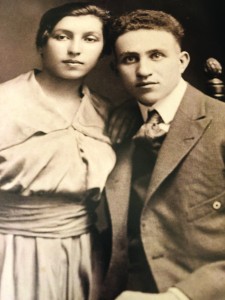Like so many immigrants who came to America around 1900, it took a great deal of courage to leave home. They came to escape persecution and hunger. They came not speaking English and often going to a kind relative they’d never met.
My four grandparents were part of this migration and they all came from what was then Russia. Three of my grandparents came as small children and bit by bit, as they could afford it, their immediate families reunited.
Growing up, we children knew very well Grandma Annie’s brothers and sisters. The Brooklyn apartment bustled with this extended family. They spoke with accents, broke into Yiddish when “der kinder” were nearby. They drank tea from a glass with a sugar cube between their teeth, kept cases of seltzer under the kitchen sink, and ate all the familiar Jewish foods. As children, we pretty much took all of these relatives for granted.
Three of my grandparents died while I was still a young teen. It is easy now to regret not getting to know them better; we were too busy being kids to be curious.
My paternal Grandpa Joe was the one with no other family. He was a bit of a tough guy, not easy to know. Why did the other grandparents have so much family and he didn’t? Who were his people? Where in Russia had he come from? Why alone? We heard three rumors: that he arrived here at age 16, that his mother was a mid-wife, and that his sister was an actress. This was flimsy stuff at best, but finding the answers became a bit of an obsession.
In 1999, I got a big piece of the puzzle.
That fall, our Federation announced a mission to Ukraine in November. I had no interest in going to Ukraine in the winter.
Several days later, however, my dad dropped by with some papers he wanted me to keep. Looking through, I came across my Grandpa Joe’s naturalization paper. He wrote his name as ‘Joseph Daniel Helfant,’ but just above that, he wrote ‘Josef Elfantel.’ Our actual surname! I quickly found him on the Ellis Island site. The ship Argentina’s manifest listed him as 16 years old, accompanied to the ship at Triest, Austria by his father, destination 127 Hester St., New York, birthplace Kiev and resident of Zyhtomir.
I looked back at the Federation’s itinerary and saw Kiev with a day in Zyhtomir. Ukraine in the winter it was.
Of course, one day in Zyhtomir was not enough time to research our name, but the visit gave me other things. At the Jewish cemetery, the portraits on the gravestones looked so much like Grandma’s family. A home visit to an older lady’s apartment could have easily been the Brooklyn apartment of my childhood. I felt overwhelmed with emotion walking the streets where my grandpa grew up and knowing that he could never have imagined one of his grandchildren visiting there.
Over the next 21 years, I entered our name in every site I could think of, including Yad Vashem. No results. Then out of the blue, I got a text from my nephew, Jaime, who had been on 23andMe and had gotten a message months earlier that he had not seen. The message was from a woman named Ingrid, who asked if by any chance the name Helfant was related to the name Elfantel. She said that her grandmother was an Elfantel, from Zyhtomir and that her much older brother had emigrated to America. Jaime replied, but got no answer from her.
I decided to try the white pages and egged on by my sister, called all the numbers for her with no result. Eventually, I reached a woman, who when asked if she was related to Ingrid, suspiciously asked why. As soon as I mentioned Elfantel she put her son, Ingrid’s nephew, on the line. He told me that his dad had done research and had created a family tree that he then pulled up on his computer. This is finally when I learned about Grandpa Joe’s family.
Our great grandparents were Riva and Mordechai, he was an army doctor and she was a nurse. This explained the mid-wife rumor. They had five children. Grandpa’s older sister Manya (Maria) married Feodor Pruvanov, and they were both actors; another rumor confirmed. His brother, Boris, had two sons: Nonik who died fighting in Kharkov and Marik, a fighter pilot killed in Vienna by a sniper. Grandpa Joe’s next brother was Volodya whose wife and three children are believed to have been murdered at Babi Yar. Volodya was imprisoned in Stalin’s camps until the end of the war. He later remarried, had two daughters and settled in Alma-Ata. That leaves Grandpa’s youngest sister, Ingrid’s grandma, Elizaveta (Lisa). She was a nurse married to an Army captain who survived the war with her daughter and nine-year-old granddaughter, Ingrid.
They emigrated to America in the 1980s.
Ingrid has since sent me a number of photos of our great grandmother and grandpa’s siblings and nephews. She also included her grandmother’s statement of survival. I was told that they were an educated family, and like my grandpa who never missed listening to Live at the Metropolitan Opera on Saturday afternoons, her grandma was an opera lover.
She has promised to translate more of her mother’s journals, but in the meantime, I now know that Grandpa kept in touch with his family until he lost contact with them during the war. My dad recalls letters that stopped coming at that time. Apparently, he tried to encourage them to come to America over all of those pre-war years, but without success.
All of us are the lucky recipients of those who bravely took a leap of faith. Thank you, Grandpa Joe for that gift. Your family is so glad to know so much more about you.
–Shelia Josephberg


